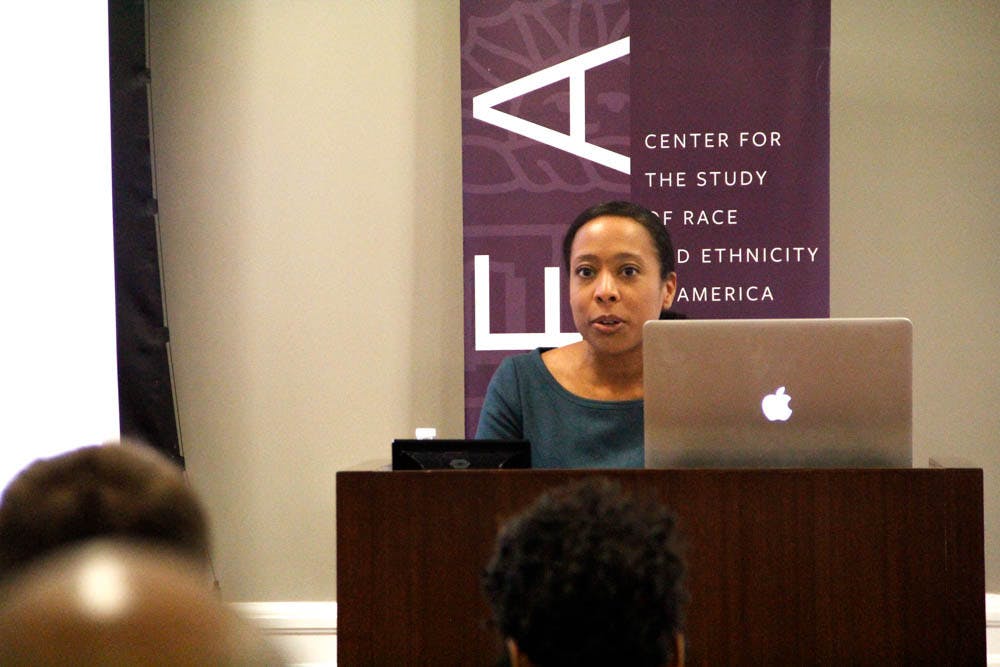“When you’re thinking about blackness, or black women or other underrepresented groups, you’ve got to think about how ideas come into public in different ways — alternative, creative, and really empowering and powerful modes of … galvanizing people,” said Assistant Professor of History Emily Owens Thursday afternoon.
In her introductory speech, Owens spotlighted the strategies that Ashley Farmer, assistant professor of history at University of Texas-Austin, used to analyze the role black women played in the Black Panther party.
During a Thursday talk hosted by the Center for the Study of Race and Ethnicity in America, titled “The Black Women Intellectuals and Activists Who Revolutionized Black Power,” Farmer spoke about the influence of black women in political movements, a role often overlooked by historians. “Black women used … literature and artwork to push the (Black Panther) party to formulate and endorse gender inclusive ideology and organizational culture. And their success at reshaping the party’s gender dynamic shows that the Panther’s record on gender roles was more progressive and complex than we previously acknowledged,” Farmer said.
Throughout the talk, Farmer demonstrated how black women used intellectual products to challenge gender roles and cast a broader conception of being a revolutionary. In doing so, these women expanded their roles in American society, she added.
For instance, through her analysis of Linda Greene’s lyric essay “The Black Revolutionary Woman,” Farmer contended that the traditionally masculine and militant image of the Black Panther party isn’t the “only axis by which we have to measure black women’s ability to be panthers and revolutionaries. … I see Greene, here, as offering a holistic vision of the female revolutionary persona instead of fitting black women into masculine constructs and challenging the idea of the revolutionary itself — that the revolutionary had to be a man.”
Farmer’s talk also included analysis of several different works produced by activists such as Gayle Dickson and Tarika Lewis. The works, which were primarily published in the Black Panther — the party’s namesake newspaper — ranged from drawings and mixed media pieces to poems and literature.
To conduct the research underlying her broader theory, Farmer interviewed various women involved with the Black Panther party, and examined the artwork and poetry that they and their contemporaries have produced.
We get a different story when “we not only center black women, but also focus on their writing and their intellectual production. Indeed the very same periodicals, as you see here with the Black Panther newspaper — that scholars often used to frame black power as male dominated or sexist — are actually brimming with information about black women’s thoughts, actions and philosophical leanings,” Farmer said.
Reflecting on Farmer’s novel techniques, Owen said Farmer showcased “what good history is. That’s how we find stuff. (These women) pointed her in directions other historians have just missed.”
“She’s really shown us that women were there, and that they were transformative within the Black Panther party,” she added.
Magalis Santana, a Cranston resident and recent Rhode Island College graduate, attended the talk because she wrote a thesis on the “intersectionality of feminism, and (the event) piqued my interest.”
Santana liked how Farmer’s analysis of art broke the “cookie cutter” sensibility of history study by not relying on traditional sources of information such as books and other texts.
“I really hope this event will solidify the importance of Black women through the Civil Rights movement and other activist events as black women are often left out of the picture,” said Kimberly Collins ’22, who also attended the event. “Helping put the frame and the work of black women into a greater, larger context will help not only inspire me but make clear the role women have throughout these movements.”





